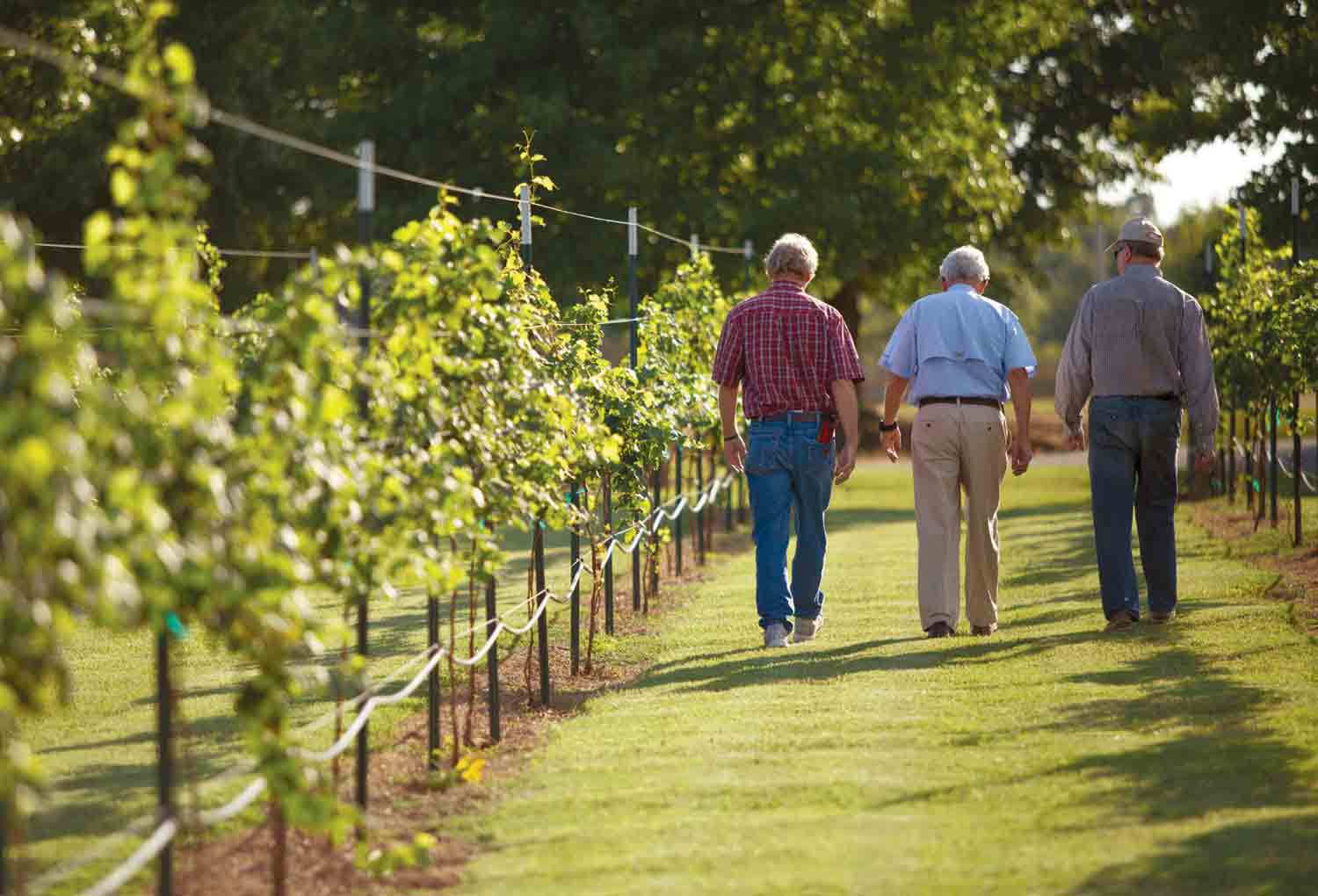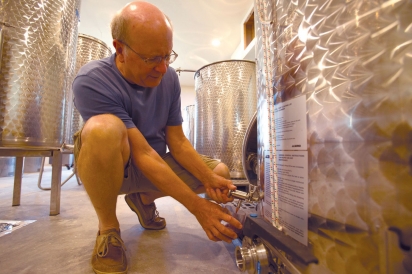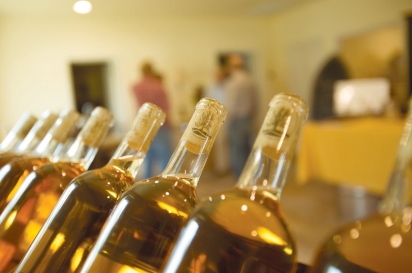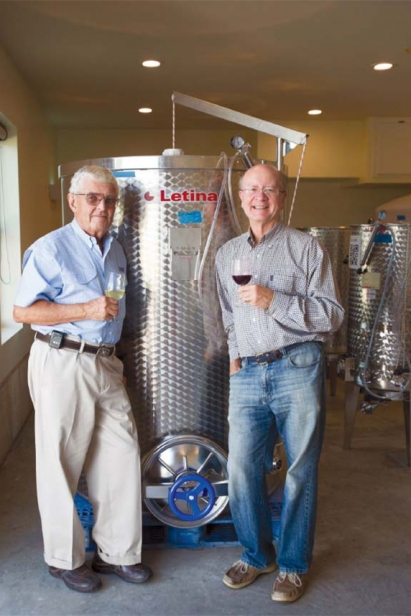The Science of a New Vineyard: A Physicist, Priest and Winemaker Launches Pecan Creek Winery
What do a physicist, an Episcopal priest and a winemaker have in common?
No, this is not the beginning of a bad joke; it is the beginning of a new winery that is the vision of a man who just happens to be all three of those things, Bob Wickizer.
Wickizer worked in medical schools and physics labs for more than 20 years and was a physicist in California’s Silicon Valley until he decided to attended seminary school in 1995. He even preached at the Washington National Cathedral until the pull of home got the better of him. Being from the Midwest, he and his wife made their way back and settled in Muskogee, where he serves as the rector of an Episcopal church during the day and owner of Pecan Creek Winery by night.
For years Wickizer and his wife have been making wine at their home and after a partnership offer from a friend, Dr. D.I. Wilkinson, they began the process of growing their own grapes and opening a commercial production facility. The Pecan Creek Vineyard began in April 2013 when they planted over 500 grapevines; that has since grown to more than 1,200 plants.
The grapes they are focusing on are French- American hybrid Chambourcin and Vignoles grapes, European varietal Merlot grapes and the newest addition to their hopeful harvest, Cabernet Sauvignon grapes that have been planted at the winery down the road from the vineyard.
The modesty of a minister comes out when Wickizer claims he is just the winemaker and the viticulture is left up to his partner, but he is observably involved in every step of the process. From the careful examining and lining up of the rows to ensure a pretty picture accompanies the beautiful wines to his self-professed “science project” that allows the well water to reach the drip irrigation, his passion and attention to detail are evident throughout every aspect of the vineyard.
Wickizer explains that even though grapes are a natural plant, the way you have to manage them for wine-making is completely different than the way they manage themselves in the wild. Pecan Creek achieves this careful balance of taming nature by the different types of trellises they have designed around their diverse grape varieties.
Depending on the hybrid of grape in a particular row, those grapes get a different trellis. The French-American hybrid grapes, like the Chambourcin and Vignoles, tend to grow their fruit downward so they are on a top-cordon wire that holds the vines and the fruit. The Merlot and Cabernet Sauvignon tend to grow their fruit upwards. These grapes are growing on a vertical shoot positioning cordon wire that can be raised up and the tension increased, as the fruit gets heavier. This also helps to manage the canopy as the leaves fill in.
By the time all the plants are mature enough to begin harvesting, they should hopefully produce a gallon of wine per plant.
As impressive as the vineyard and all those plants sound, until these vines are mature enough to reach full production, which is still possibly three years away, Pecan Creek will continue purchasing grapes from other growers. Their focus is on producing wines from grapes grown primarily in Oklahoma, but for the time being will also feature some from Arkansas and Missouri.
At Pecan Creek Winery they take a practical approach to wine-making that uses the least amount of intervention to turn the fruit into wine.
Just down the road from the vineyard is the winery that also features a tasting room. During this tour the vineyard was not completely finished (though it is up and running now) and the wine was still being produced in the Wickizer’s garage. But the word “garage” is used very loosely, considering they have a full-on wine producing facility, with nine commercial tanks and a total capacity of over 1,200 gallons of wine.
One of Wickizer’s favorite things about wine is the blending and tasting with other people; this became even more obvious as we sampled multiple wines directly out of the spouts of the massive stainless steel tanks. He even shared one of his blending techniques. After a careful sampling of the Chambourcin in the tank he determined it to be too flabby, and incorporated six gallons of a heavily concentrated oaked wine into that same tank.
Six gallons added to over 200 gallons of wine seems like a miniscule amount, but the way it rounded out the flavor profile of the wine, even before it was bottled, would quash anyone questioning Wickizer’s wine-making skills. Another blending technique that is particular to Pecan Creek is the incorporation of an all-natural secret ingredient to their Coyote Red wine that helps to add flavor and increases the tannins naturally. This ingredient seems to be uniquely Oklahoman and is not used in any other commercial winery. Just recently, while hosting a tasting for a local Tulsa wine club, the members were having quite a hard time trying to pinpoint exactly what the flavor was. Wickizer had to cave and fill them in on his secret.
As particular as he is about the flavor in his wine, Wickizer is just as particular about the cleanliness of his winemaking environment. He works by the principle that a good, clean working environment helps reduce bacteria and helps him control even more aspects of what he is producing. His science background is ever present in his attention to this cleanliness and is something to be marveled for any laboratory—let alone making wine.
With multiple levels of sterilization on every instrument, barrel or surface that touches the wine, bacteria and infection don’t stand a chance. Even the inside and outside of the spouts get cleaned every time he pours a glass from the tanks. He says that if you get a chance to go into the operations of a winery “Look at the drains. If you’d be willing to eat off the drains, you’ve got a good place with good sanitation.” But this is all not without reason. Wickizer says he has tasted multiple wines from different wineries where you could smell or taste the bacteria or mold, and he refuses to let that happen.
“Life is too short to make crappy wine,” he said.
Another advantage to opening a winery in Muskogee is an opportunity to give back to the community. Th e way Wickizer sees it, he could invest his money in something else with a much better return for a whole lot less work. But what does that contribute to the town?
Pecan Creek is a new business that is already contributing to employment, local arts, teaching and even organized events. This is a living lesson in showing people with money that it is OK to invest in their community and maybe make a difference.
In 2014 Pecan Creek will release six wines including the dry Coyote Red, a sweet Chambourcin, two Rieslings, a Vignoles and a rose. Later they will also be releasing a pear dessert wine and a blackberry dessert wine. Though still in its infant stages, this winery is setting the bar high for local wine. To even the most casual observer it is evident that everyone from Wickizer to the pruners babying the newest of vines has a passion for what they are doing and a commitment to see the entire process through.
This dedication is even more evident when you taste Pecan Creek Wine. As their wine label says, “We are proud of our Oklahoma grapes… We are passionate about creating outstanding local wines that will make you proud too.” These wines are something any Oklahoman can be proud to say came from their home state.
For Wickizer, Pecan Creek is about people enjoying a product and being pleased that it came from their community.
“I like to see the reaction on people’s faces when I tell them that a wine came from Oklahoma,” said Wickizer. He knows from experience that great wines are possible in Oklahoma and people are often pleasantly surprised when they hear where it came from. “That’s a real plus for me.”








